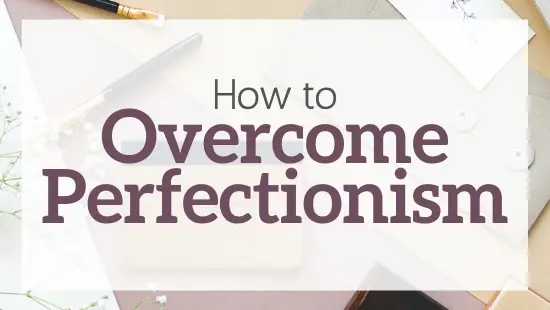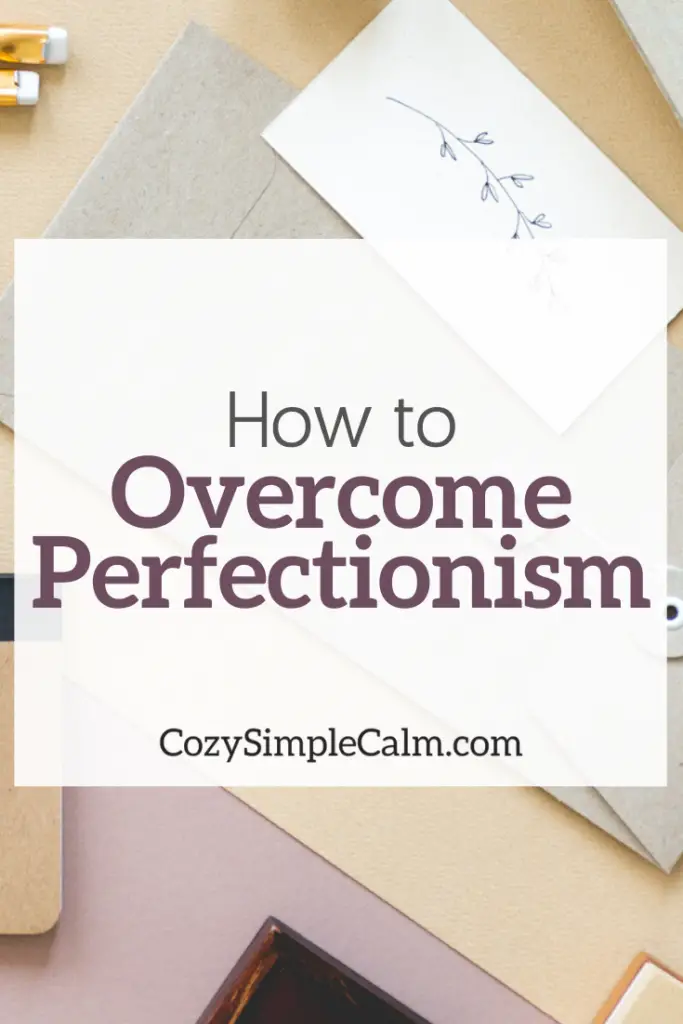
Note - Affiliate links may be used in this post, including Amazon affiliate links. I may receive a small commission at no extra cost to you if you use my affiliate link. But don't worry, all the opinions expressed are my own!
How to overcome perfectionism
Is perfectionism becoming an obstacle in your life? Today, we’re talking about why being a perfectionist isn’t a good thing and how to overcome perfectionism!
“You’re such a perfectionist!” How many times have you heard that before? If you’re reading this, probably more than a couple. And the funny thing is, it rarely sounds like a positive observation…
Perfectionism… It sounds like such a good thing, doesn’t it? Aiming to always be above average, the best at something, generally a high achiever. But, is it really such a good trait? Let’s get into that a little bit.
Are you a perfectionist?
First, do you consider yourself a perfectionist? You probably already know your answer, but here are a few clues:
- You would rather NOT try something if you don’t believe you will do it well
- You see success and failure as the only 2 options
- You dislike people telling you a better way to do things
- You have impossibly high standards for yourself, and sometimes for others around you
- You tend to procrastinate
Any of those sound familiar? Yeah, me too. I call myself a recovering perfectionist. The tendencies are still there. In fact, I’ve been struggling a little bit while writing this, because it’s an important topic and I want to explain it…well, perfectly. But I actively fight those annoying tendencies now.
See, like many of you, in my head it made sense. If I did everything well, if everything was perfect, life would be easier. Days would run smoothly, I wouldn’t have anything to worry about, and I could just relax and be happy.
The funny thing about “perfect”? You will never make it. It’s simply not possible to be perfect. And for a perfectionist, that leads to all kinds of bad. Instead of being a goal, perfectionism actually becomes an obstacle. Instead of the calm, peace, organization, and overall good that we think perfection will bring us, we end up with:
Anxiety & stress
Trying to get everything right, scheduled, and organized, and…well…perfect? It’s an exhausting goal. It never ends. Nothing is ever finished. And that leads to a LOT of stress & anxiety in your life.
Trouble relaxing
I have a really hard time relaxing, and I can pinpoint a lot of it to those perfectionist tendencies. It’s hard to relax and have fun when there is always something that needs to be adjusted or fixed or tweaked.
Self-doubt
Aiming for perfect is an impossible goal to reach. And not reaching your goals can lead to a lot of self-doubt! You find yourself thinking things like “Maybe I’m not good enough” and “Maybe I can’t do this”
Procrastination
This has always sounded counter-intuitive to me, because how can a perfectionist also be a habitual procrastinator? But if you break it down, it makes SO much sense. Perfectionists will avoid starting or trying something if they think they won’t be able to do it well. If you can’t be perfect, why try at all? And that kind of thinking leads to…procrastinating. If we can’t do it perfectly, we’d rather not do it at all!
Difficulty forming habits
Forming new habits is always a little tricky. It’s something that shakes up your normal, in a big or small way. But perfectionists have this little quirk…forming a new habit is an “all or nothing” project. If something goes wrong, we miss a day or life gets in the way, we tend to scrap the whole idea. Usually with a promise to ourselves that we’ll start again on Monday (or next week, or next month, or next year…you get the idea)
Self-sabotage
Have you ever, somewhat intentionally, created a situation for yourself where the outcome can’t possibly be perfect? For example, you fill your life with so much “busy” that no one could possibly expect you to do it all well. It’s the perfect excuse to be imperfect.
That list is not exactly what we’re going for, is it? In fact, when you write it all out like that, it sounds downright unhealthy.
So, fellow perfectionists, why do we try so hard?
There are several reasons:
Because we don’t want to let anyone down
Expectations, real or perceived, are a big deal for a perfectionist. If we don’t meet the standards that people around us have come to expect, we’ll be letting them down (and letting ourselves down in the process).
Because we’re afraid
Fear is a really common theme for perfectionists. Fear of failure, fear of embarrassment, fear of judgment… We set impossibly high standards for ourselves because we’re afraid that if we don’t, something “terrible” will happen. We don’t try new things, because we’re afraid we won’t be good at them or that we’ll embarrass ourselves while learning to do something new. We’re afraid that if we try something big or put ourselves out there, without the perfect plan firmly in place, people will judge us for our lack of preparation or imperfect execution.
Because “perfect” gives us a sense of security
Perfectionism is all about control. And control is all about security. If we can do it (whatever “it” happens to be) exactly right, things couldn’t possibly go wrong. If we’re the perfect employee, we couldn’t possibly lose our job. If we have a plan, everything will be alright. Spoiler alert – it’s a false sense of security.


How can we overcome perfectionism?
Here’s the part that you’ve been waiting for – The perfect way to overcome perfectionism! Just kidding. I’m sorry to say it, but there is no perfect way. And you’re going to get it wrong…a lot. But here are a few ways to combat that little voice in your head that is constantly telling you to get everything exactly right.
What to do when you get stuck on “perfect”:
Ask yourself “What’s the worst that could happen?”
A lot of the time, you’ll find that the outcome if something isn’t perfect…well, the end result isn’t actually that bad. It may be annoying, frustrating, or embarrassing, depending on the specific situation, but the world won’t fall apart.
Think of the bigger picture
When we get stuck on perfect, everything is a big deal. But, is it really? Will you even remember it tomorrow? Or next week? Or next year?
Leave something intentionally imperfect
Did you cringe reading that? I’ll admit that this one is in the cognitive behavioral therapy realm, but if you want to change something, be intentional about it. Leave something imperfect on purpose. Ideally, something that’s meaningful to you personally.
I’ve always heard stories that it’s an Amish tradition to intentionally leave a mistake in their beautiful quilts. (I’ve also heard that’s a complete myth, but I like the idea.)
By making the CHOICE to accept imperfect, you’re taking back control. Control of your need to be the best, control of your fear that someone will point out your mistake, and control of your tendency to fix everything.
Lower your expectations
Did you know that no one actually expects you to be perfect? To get everything right? That’s all coming from you. Perfectionists, myself included, set unreasonably high expectations for ourselves. And while having high standards isn’t a bad thing, having unreasonable and impossible expectations is. So make an effort to lower the bar a little. Learn to be okay with “okay” in more areas of your life, and save the high standards for the things that really matter.
Concentrate on the process instead of the outcome
If you have perfectionist tendencies, you probably find yourself more focused on the end result than the process. You’re not thinking about what you’re doing, you’re thinking about how it will be when it’s done. But take a step back and try focusing on the process instead of the outcome. Try aiming for progress instead of perfection. Strangely, when you begin to implement this, you’ll actually find yourself accomplishing more!
Talk about it
Another tendency of perfectionists is trying to hide the fact that we’re working really hard to make things perfect. This leads to us feeling a little like martyrs, because no one notices how hard we’re working! A vicious cycle, since we’re the ones trying to hide it. Instead, talk about it. You might find (scratch that, you probably WILL find) that a lot of the things you’re working so hard at, don’t even matter to anyone but you.
Change the way you think about failure
Failure is a dirty word for perfectionists. We tend to avoid or give up at the very thought of failing. But failure is only permanent if you quit. Failing at something is actually one of the best ways to learn what DOESN’T work. Trying something. Fail. Try again.
Be kind to yourself
Think about the words that you say to yourself throughout the day. Would you be friends with anyone who said those same things to you? Be aware and try to flip thoughts like “I’m not good enough to make this work” or “This is never going to be right” into something positive, like “I’m going to try, but it’s okay if it doesn’t go as planned.”
Prioritize
Because we have such high standards for ourselves, we fully expect to be able to get everything done! We expect to be able to go to the gym, go to work, cook an amazing dinner, clean the entire house, and finish an entire project, all perfectly, all in one day.
And I fully believe that you can do everything and do it well. But you can’t do it all at once. So prioritizing is key. Pick the most important things, focus on them, and let the rest wait.
For more on how to prioritize, check out How to Prioritize and Plan Your Day in 6 Steps
And remember, perfection is not a perfect goal. It’s just a perfect way to add stress to your life.
What steps have you taken to overcome perfectionism in your own life?



Great tips! I especially like the one to talk about it.
I feel like I was more of a perfectionist as a kid, but the older I got, the more importance I put on meeting deadlines which usually meant sacrificing quality. Many tasks you’re given to do usually have a time limit. So it taught me to abandon perfection, but I usually end up dissatisfied with my work, seeing only the flaws. I’ve had to learn with my own personal projects not to put a deadline on it so I can take my time and have a finished piece that I can be proud of whether it’s writing, art, or a home remodeling project. Great topic!
Great idea! Take your time, where and when you can.
The, we dont want to let anyone down, really got me because its true! Nice to read about others.
Fab article. I’m also a recovering perfectionist – although I don’t have a problem trying new things. Just sticking with them when the inevitable happens and I “fail”.
Thanks for all the great tips. I’m going to be able to use them for sure. 🙂
This is so insightful, especially with the holiday season well and truly underway! I feel that there is an overwhelming pressure to be perfect during this season so this post is really helpful and I will definitely be saving for later! 🙂
Thank you so much for this! I like the idea of keeping things imperfect. It’s the ultimate way to force yourself out of that perfectionism.
When I see how other people make mistakes all the time and nobody bets an eyelash I really think about how I block myself with this silly perfectionism.
This post resonated with me such much! I’m sometimes a perfectionist! Lol
Perfectionism always seems to show it’s face when you least expect it, doesn’t it? LOL
I needed this really badly, thank you! Pinning for later, such a great helpful guide!
Thank you for pinning! ❤